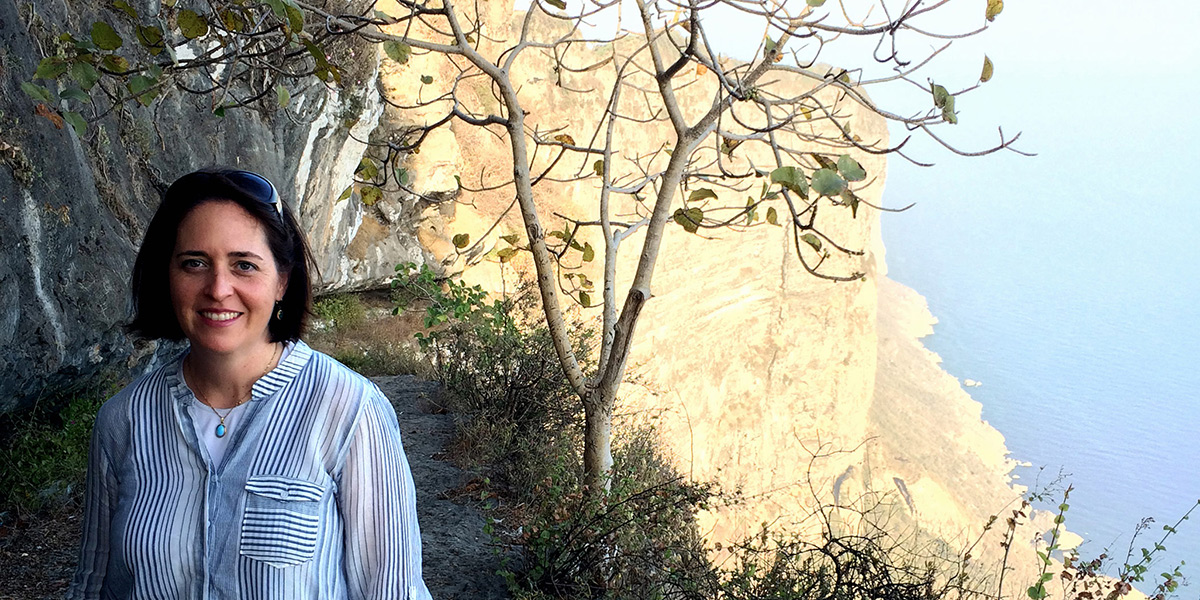- Future Students
- How to Apply
- Visit UHCL
- Admitted Students
- Tuition, Costs and Aid
- Degrees and Programs
- Contact Admissions
- Current Students
- Class Schedule
- Academic Calendar
- Advising
- Events
- Library
- Academic Resources and Support
- Student Services and Resources
- Alumni
- Lifetime Membership
- Alumni Events
- Update Your information
- Awards and Recognitions
- Give to UHCL
UHCL professor finds inspiration, opportunities in Oman
July 15, 2016 | Kelsie Cleboski

Sultan’s palaces, ancient mosques, Portuguese forts and archeological sites are among
the hidden treasures of the Sultanate of Oman. A unique mix of sizzling dunes, craggy
mountains and tropical coastline set on the tip of the Arabian Peninsula, Oman is
an ideal place for students and scholars to experience the Middle East, says University
of Houston-Clear Lake Associate Professor in Anthropology and Cross-Cultural Studies
Maria Curtis.
She visited Oman with faculty members from the U.S. as part of a National Council on U.S. Arab Relations program as an Alwaleed Bin Talal Fellow to encourage scholarly dialogue between Oman and the rest of the world, and she’s eager to share her experiences with students and introduce them to the sights and insights that study abroad in the Middle East can provide. She is currently serving as the cultural ambassador of Oman for the World Affairs Council of Houston and makes visits to schools and organizations that hope to learn more about the country.
“Oman is a beautiful place,” she said. “It has great potential as a country where we could send students for longer study or internships.”
Oman is a unique player within the Arab world, though it’s not widely known, Curtis said. It is roughly the size of Kansas, with a population of 4.4 million people and a highly diverse society. Oman shares borders with Yemen, Saudi Arabia and the United Arab Emirates, but many questions Curtis fields at her talks about Oman are from people from other Arab countries who are unfamiliar with their coastal neighbor.
Curtis said that Oman, contrary to western perceptions of the Middle East, is a place of accord. The sultan of Oman has played the role of peacemaker between Iran and the United States. Shiite, Sunni and Ibadhi mosques, Hindu temples and Christian churches dwell in harmony mere blocks away from each other.
“Oman is a place where interfaith dialogue exists in a vibrant way. It’s one of the calmest, safest places I’ve ever been. Everyone was warm and welcoming,” Curtis said. “I felt like I saw the very best that the Arab world has to offer.”
Students who plan to live and work in Houston would do well to learn more about the Middle East, Curtis said.
“We are a major port city with an economy built on oil and gas, so our relationship to the Arab Gulf is very strategic and important,” she said.
Curtis, who is also chair of the School of Human Sciences and Humanities’ International Initiatives Committee, sees opportunities in Oman for students studying disciplines as varied as business, history, cross-cultural studies, healthcare and anthropology.
She has nurtured UHCL’s Middle Eastern studies offerings from the ground up since 2007, advises UHCL’s Model Arab League team (which has represented Oman twice) and was instrumental in developing UHCL’s minor in Middle Eastern Studies.
“I hope students understand that the U.S. has had a very long connection to the Arab world, and to Oman,” she said. “I look forward to take students there.”
Curtis is currently planning an Oman study abroad trip scheduled in December 2016 for UHCL students.
To learn more about UHCL’s courses and opportunities regarding the Middle East, email Curtis at curtis@uhcl.edu.






